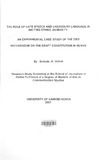| dc.description.abstract | In many countries world over, and especially in Africa, identity politics, hate speech
--
broadcastetl in the media has had profound consequences on different ethnic
communities. Hate speech has in the past fuelled violent confrontations along ethnic lines, leading to ethnic conflicts that have claimed lives. The 2005 Referendum on the Draft Constitution in Kenya Campaigns were no exception. The campaigns on the both 'yes' or 'no' sides were riddled with hate propaganda and unsavoury
language. This information was broadcasted live on many FM stations and the local
language FM stations across the country.
This study seeks to investigate whether the exposure of the Kenyan ethnic communities to hate speech and unsavoury language on radio stations in Kenya
incites feelings of ethnic animosity against other communities. The study uses an
.experimental methodology to expose a sampled group of ethnic communities to a select number of utterances made by politicians with a view to establish the extent
to which utterances used by politicians and broadcasted on FM stations could excite ethnic animosity. ...
The study generally seeks to provide documentary evidence that would strengthen the Kenya National Commission on Human Rights (KNCHR)1 and other actors" efforts to put pressure on the Government of Kenya to enact hate speech legislation for the protection of human rights and prevention of ethnic conflicts. It further seeks
to support the ad hoc efforts by non governmental organizations (NGOs) and faith
1
The Kenya National Commission on Human Rights, KNCHR) is an independent National Human Rights Institution
established by an Act of Parliament. Its core mandate is to further the protection and promotion of human rights in
Kenya.
2 The civil society, the private sector, the informal sector, professionals and other organized groups
based organizations to forestall acts of violence that use ethnic nationalism as a justification.
The study specifically seeks to:
a) Investigate whether audio reports made during the referendum process in Kenya are likely to trigger feelings of ethnic animosity amongst different ethnic communities in Kenya.
b) To investigate whether the reactions of the communities are likely to spur ethnic conflict.
Reporting formats, including facilitator's" guiaes, questionnaires and other data collection instruments including tape recorders were used to collect data. The data collected was qualitative in nature, and was analyzed to prove/not prove the hypothesis.
One of the key findings of this study was that hate speech and unsavoury language used by a number of politicians during the 2005 Referendum on the Draft Constitution in Kenya triggers feelings of animosity amongst different ethnic
""
communities. The study also established titrate. radio plays a big role in exciting
~
and fuelling feelings of ethnic animosity amongst ethnic communities in broadcasting hate speech and unsavou~ language. It further established that when hate speech is unaddressed for a long period of time, it may result into widespread ethnic conflicts. The study thus concludes that hate speech and unsavoury language plays a big role in fuelling ethnic animosity amongst different communities in Kenya.
Among the key recommendations of this study include the need for the Kenyan Parliament to pass the 'Prohibition of Hate Speech Legislation Bill' as a matter of urgency to foster national unity, promote ethnic and cultural diversity, democracy and
preserve public order. The study also recommends to the media to exercise its watchdog role with greater objectivity and social responsibility, and adhere to journalistic code of ethics | en |

